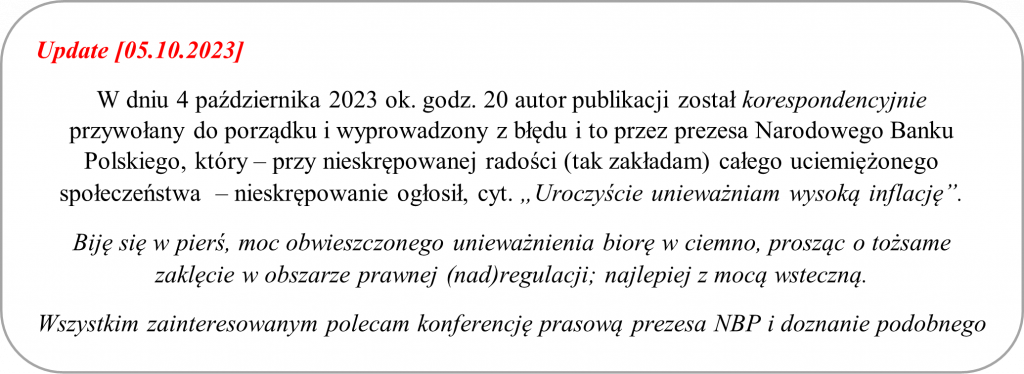By way of introduction, not obvious….
Inflacja – słowo i pojęcie równie dobrze znane, co cieszące się powszechnie niepochlebną opinią. Inflacja (łac. inflatio – nadęcie) – oznacza wzrost, przyrost; najczęściej stosowane w ekonomii, gdzie -wedle najprostszej definicji - oznacza proces trwałego wzrostu ogólnego poziomu cen w gospodarce.
Although mainly associated with economics, it also has applications outside of it, within its meaning, but there are spheres and areas where it should not even come close. Such a sphere is certainly the Law in the sense of regulations collected In the form of legal acts of various orders. Systemically Law should guarantee order and provide a sense of security. If we juxtapose the two concepts, we have inflation of the law – a phenomenon that is by all means undesirable, but which unfortunately exists and contradicts the said order, sense of stability and security.
In the legal space, there are constantly pending either brand new regulations or amendments to existing ones, or even further changes to earlier amendments. It happens to legislators to change enacted laws before they come into force, or to change provisions specifying how laws that change a particular legal order come into force several years back, or to enact retroactive laws. One can only mention other sins such as disregarding public opinion, the voices of specialists in a given field, smuggling important changes and regulations into laws that have nothing to do with the subject of the changes and, ultimately, the low quality of the laws passed.
Law and calendar (time, deadlines) have a lot in common and this is not objectionable (deadlines allow to define and maintain order, organize, discipline), inflation and time – also agree, but inflation and law should be kept away from each other, unless we mean to introduce by the power of legislation dates repeal inflation – very tempting, but acutely impossible, unfortunately.
The inflationary activity of the legislature has resulted in the enactment of many significant changes in the area of pharmaceutical and peri-pharmaceutical law.
What has changed in this area in the recent period, what is yet to change and what are the effective dates Schedule of selected changes (due to the comprehensiveness of the changes, includes selected changes, up to the beginning of 2024)


In September, the Journal of Laws published two important amendments for the market – (1) the first only seemingly unrelated to the market, (2) the second directly related to it and amending several important pieces of legislation.
- Law of July 13, 2023. On amending the Law on Export Insurance Guaranteed by the State Treasury and certain other laws – Journal of Laws 2023.1859 of September 13, 2023.
- Law of August 17, 2023. On amending the Law on Reimbursement of Medicines, Foodstuffs for Special Dietary Purposes and Medical Devices and some other laws – Journal of Laws 2023.1938 of September 20, 2023.
|
Lp. |
Subject / content of the amendment |
Law / regulations |
effective date |
|
1. |
“pharmacy for the pharmacist” cont. – Prohibition of “acquisition of control” and concentration of pharmacy business – more than 4 pharmacies operated independently or controlled by capital or personal ties, – Revocation of authorization by a decision of the WIF / GIF for an entity violating the prohibition on acquisition of control and concentration, – Monetary penalty for the act of taking control and concentration (50 thousand – 5 million zlotys) imposed by the WIF (administrative decision) |
Pharmaceutical law (Articles 99aa and 99ab) (Article 103 2a-2d) (Articles 127cd; 127d) |
(14 days after announcement) 28.09.2023 |
|
2. |
Limiting the quantity of a medicinal product, foodstuff for special nutritional use or medical device on a prescription to a 120-day period of use calculated on the basis of the dosage regimen specified on the prescription |
(Article 96a (7a)(2) of the Pharmaceutical Law) |
18.08.2023 (entry into force 1 day after enactment, before announcement) |
|
The amount and method of financing of preventive vaccines |
On health care services financed from public funds (art. 97 par. 3i – 3l) |
22.09.2023 (chewing entry 1 day after announcement) |
|
|
Principles of immunization, mandatory immunization, financing of immunization, pharmacy immunization cont. |
On prevention and control of infections and infectious diseases in humans (Articles 17-19, 21a) and on publicly funded healthcare services |
01.10.2023 r. |
|
|
– Wholesale margin amount – 6%, minimum 50 gr and temporary retail margin table until 31/12/2024. – reimbursement for OTC medicinal products, – return of medicinal products that have lost reimbursement, – lower patient payment for medicinal products manufactured in Poland, – Introducing a form of “negligible violation” that gives wholesalers and pharmacies the option to refrain from revoking their licenses, – Free samples of medicinal products for pharmacists – only from the OTC availability category, – P-type and N-type prescriptions only in electronic form, – The possibility of using a substitute medicinal product also with the designation “NZ” (upon request or with the patient’s consent), – Limiting the quantity of a medicinal product, foodstuff for special nutritional use or medical device on a prescription to a 120-day period of use calculated on the basis of the dosage regimen specified on the prescription, and developing this rule to mean that the next dispensing can occur after the expiration of 3/4 of the period for which the prescription was filled – Granting during pregnancy or puerperium free supply of drugs or medical devices specified in the list on the basis of a recpet valid for 1 month |
Reimbursement Act (…) (Article 7, Articles 30a and 30b, Article 34a, Article 6(2a) Article 43b etc.). Pharmaceutical law (art. 81 para. 1a, 103 para. 1b, Art. 54 para. 5, Art. 95b para. 1a, Art. 96a para. 1d point 2, para. 1da and db, 96a para. 7aa, |
01.11.2023 |
|
|
– Obligation to supply reimbursed drugs in equal proportion to at least 10 entrepreneurs operating pharmaceutical wholesalers whose scope of business does not include assortment restrictions, with the largest share of turnover with general pharmacies in terms of the number of transactions, in the amount necessary to secure patients, the list of wholesalers will be determined annually by the MZ by April 30, based on data on turnover of reimbursed products between pharmaceutical wholesalers and general pharmacies for the previous calendar year, based on data contained in the ZSMOPL, and published in the BIP, – Reimbursement announcements every 3 months, announced 14 days before the effective date, – New rules for on-call pharmacies |
(Reimbursement Law (…) art. 34 par. 3a-3d, Art. 37 paragraph. 6, pharmaceutical law – art. 94 etc.) |
01.01.2024 |
Author: mec. Dariusz Marczuk
